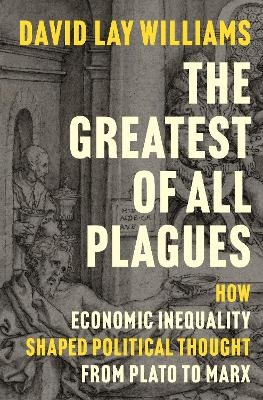
The Greatest of All Plagues
How Economic Inequality Shaped Political Thought from Plato to Marx
Seiten
2024
Princeton University Press (Verlag)
978-0-691-17197-5 (ISBN)
Princeton University Press (Verlag)
978-0-691-17197-5 (ISBN)
How the great political thinkers have persistently warned against the dangers of economic inequality
Economic inequality is one of the most daunting challenges of our time, with public debate often turning to questions of whether it is an inevitable outcome of economic systems and what, if anything, can be done about it. But why, exactly, should inequality worry us? The Greatest of All Plagues demonstrates that this underlying question has been a central preoccupation of some of the most eminent political thinkers of the Western intellectual tradition.
David Lay Williams shares bold new perspectives on the writings and ideas of Plato, Jesus, Thomas Hobbes, Jean-Jacques Rousseau, Adam Smith, John Stuart Mill, and Karl Marx. He shows how they describe economic inequality as a source of political instability and a corrupter of character and soul, and how they view unchecked inequality as a threat to their most cherished values, such as justice, faith, civic harmony, peace, democracy, and freedom. Williams draws invaluable insights into the societal problems generated by what Plato called “the greatest of all plagues,” and examines the solutions employed through the centuries.
An eye-opening work of intellectual history, The Greatest of All Plagues recovers a forgotten past for some of the most timeless books in the Western canon, revealing how economic inequality has been a paramount problem throughout the history of political thought.
Economic inequality is one of the most daunting challenges of our time, with public debate often turning to questions of whether it is an inevitable outcome of economic systems and what, if anything, can be done about it. But why, exactly, should inequality worry us? The Greatest of All Plagues demonstrates that this underlying question has been a central preoccupation of some of the most eminent political thinkers of the Western intellectual tradition.
David Lay Williams shares bold new perspectives on the writings and ideas of Plato, Jesus, Thomas Hobbes, Jean-Jacques Rousseau, Adam Smith, John Stuart Mill, and Karl Marx. He shows how they describe economic inequality as a source of political instability and a corrupter of character and soul, and how they view unchecked inequality as a threat to their most cherished values, such as justice, faith, civic harmony, peace, democracy, and freedom. Williams draws invaluable insights into the societal problems generated by what Plato called “the greatest of all plagues,” and examines the solutions employed through the centuries.
An eye-opening work of intellectual history, The Greatest of All Plagues recovers a forgotten past for some of the most timeless books in the Western canon, revealing how economic inequality has been a paramount problem throughout the history of political thought.
David Lay Williams is professor of political science at DePaul University. He is the author of Rousseau’s Platonic Enlightenment and Rousseau’s “Social Contract”: An Introduction.
| Erscheinungsdatum | 16.08.2024 |
|---|---|
| Zusatzinfo | 1 b/w illus. |
| Verlagsort | New Jersey |
| Sprache | englisch |
| Maße | 155 x 235 mm |
| Themenwelt | Geschichte ► Teilgebiete der Geschichte ► Wirtschaftsgeschichte |
| Geisteswissenschaften ► Philosophie | |
| Sozialwissenschaften ► Politik / Verwaltung ► Politische Theorie | |
| Wirtschaft ► Volkswirtschaftslehre | |
| ISBN-10 | 0-691-17197-1 / 0691171971 |
| ISBN-13 | 978-0-691-17197-5 / 9780691171975 |
| Zustand | Neuware |
| Informationen gemäß Produktsicherheitsverordnung (GPSR) | |
| Haben Sie eine Frage zum Produkt? |
Mehr entdecken
aus dem Bereich
aus dem Bereich
Macht und Herrschaft im Zarenreich
Buch | Hardcover (2024)
C.H.Beck (Verlag)
CHF 69,85
wie die USA und China um die technologische Vorherrschaft auf der …
Buch | Hardcover (2023)
Rowohlt (Verlag)
CHF 41,95


